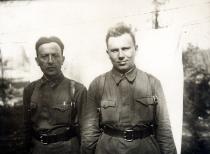This is me photographed in 1965. I had the picture taken for some official documents.
I received my diploma from the Medical Institute in Leningrad in 1946. After graduation I was directed to work in the House of Sanitary Education. When I came there, the managers were surprised. They didn't need practical doctors. So I was told to look for another job myself. I found one with the Institute of Experimental Medicine without any patronage and despite my nationality. There was no anti-Semitism yet. The only thing I was concerned about was my lack of experience. I remember walking down the corridor looking for the director's office. The director asked me what I was interested in. I said that I liked chemistry and knew how to draw. 'OK,' he remarked, 'we need someone who can work with the microscope and draw in the Histology Department.' But actually there was a vacancy only in the Department of General Comparative Morphology, headed by professor Nasonov. And my chief, Michael Abramovich Brown, was a wonderful man. Following the reorganization of the Institute I was transferred to the Department of General Pathology. I worked there for almost 30 years until my retirement. I had no time to defend my candidate's thesis due to family circumstances, but I passed the exams all right.
I have to say that my colleagues treated me well. I didn't feel any humiliation. Even in the most gruesome times, during the so-called Doctors' Plot 10. We, just like employees of other Soviet establishments, constantly had political training: we studied Marxism-Leninism, Stalin's works and historical materialism. We were permanently engaged in all sorts of political seminars and meetings. I was often appointed secretary at these meetings because of my nice handwriting. I remember how we condemned the 'poisoning doctors' in our Institute. And everyone believed it was true, including me. The paradox of the Soviet regime consisted in the fact that people were made to believe the most improbable things and even renounce their relatives. This is what one can call mass foolishness.
I got married in 1945. I got acquainted with my husband, Pavel Abramovich Rubinchik, a Jew, at a friend's home. He came from Bryansk region, from the settlement of Zhukovka. He was an engineer. After the war he worked as chief engineer at a Leningrad factory called Weaver. We lived in a communal apartment, two rooms were occupied by my husband's relatives. Then we moved to another flat. Our son, Misha, was born in 1947. The delivery was terrible. My son was born disabled. From that moment my excruciating torment began. I corresponded with Academician Filatov and addressed other prominent medical specialists, but my son remained completely helpless. He sees nothing, hears nothing and cannot speak. And he had a bulk of other diseases. How horrible it was in a shared flat with the ill child! How our neighbor scoffed at us! It was another, terrible blow to me when my husband died in 1968. I buried him in the Jewish cemetery.
Gisya Rubinchik
The Centropa Collection at USHMM
The Centropa archive has been acquired by the United States Holocaust Memorial Museum in Washington, DC.
USHMM will soon offer a Special Collections page for Centropa.
Academics please note: USHMM can provide you with original language word-for-word transcripts and high resolution photographs. All publications should be credited: "From the Centropa Collection at the United States Memorial Museum in Washington, DC". Please contact collection [at] centropa.org.












